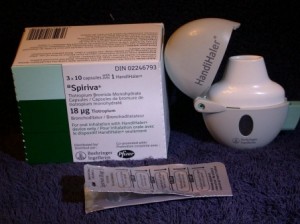What is Spiriva?
The Spiriva HandiHaler (tiotropium bromide) is a prescription medicine that belongs to a group of medications referred to as antimuscarinics or anticholinergics and is used for long-term management of symptoms of chronic obstructive pulmonary disease (COPD). Spiriva relieves COPD symptoms by opening the air passages to make breathing easier.
Spiriva is distributed jointly by Boehringer-Ingelheim and Pfizer. It is supplied in capsule form which contains dry powder which needs to be inhaled using the HandiHaler device. Each capsule of Spiriva contains 18 mcg of tiotropium and lactose monohydrate. The medication is intended only for oral inhalation and the capsules must not be swallowed.
Generic tiotropium bromide is not yet available although it is also manufactured and distributed by pharmaceutical company Cipla under the brand name Tiova.
Spiriva Uses
 The treatment of chronic obstructive pulmonary disease (COPD) is the primary use for Spiriva. COPD is a progressive lung condition that includes emphysema, chronic bronchitis, or both.
The treatment of chronic obstructive pulmonary disease (COPD) is the primary use for Spiriva. COPD is a progressive lung condition that includes emphysema, chronic bronchitis, or both.
By using Spiriva, COPD sufferers reduce the likelihood of experiencing flare-ups and all the associated symptoms, such as coughing, excess mucus, shortness of breath, chest tightness and wheezing.
Spiriva must be used daily for maximum benefit. It does not work instantly and is not intended for treatment of sudden, emergency breathing problems. In case of sudden shortness of breath or wheezing, use other quick-relief bronchodilators such as albuterol or salbutamol. After taking Spiriva for approximately two weeks, users will begin to notice that they are breathing better. However, they are advised to carry on taking their daily dose because if they were to stop, they could start experiencing breathing difficulties again.
How Spiriva Works
Spiriva belongs to a class of medications called bronchodilators. Specifically, it is considered as an anticholinergic or antimuscarinic because it binds with muscarinic receptors in the airway to relax smooth muscles. This medication is inhaled orally to help open up and keep airways in the lungs open. This results in increased flow of air and supply of oxygen to the lungs.
How to Take Spiriva
Read your prescription label or the patient information guide from your healthcare provider or pharmacist before initiating treatment. Follow the step-by-step instruction on how to correctly use the inhaler. If you do not understand the prescription or have questions, consult your healthcare provider or pharmacist.
Spiriva capsules are intended to be inhaled by mouth using the special HandiHaler. Do not swallow it by mouth. Inhale this medication once a day. Use only one capsule per day. To make sure you completely inhaled the dose, inhale 2 times per capsule. Never breathe out or exhale into the mouthpiece. Avoid getting the powder into your eyes.
Spiriva should be used on a daily basis to get the maximum benefit. As much as possible, use it around the same time of the day or take it at evenly spaced intervals. Do not adjust your dose, take more than the recommend amount, or suddenly discontinue the medication, unless specifically instructed by your healthcare provider.
Rinse your mouth with water after using the inhaler to prevent throat irritation and dry mouth. The inhaler should also be cleansed with water at least once a mount. Make sure that it is completely dry before using it again.
If you use different inhalers, familiarize yourself with every inhaler you use. Your healthcare provider may also prescribe a quick-relief inhaler medication which may be used for sudden shortness of breath, wheezing, or worsening of cough. Contact your pharmacist or healthcare provider if the inhaler fails to work.
Important Things To Remember When Using Spiriva
- Never take the capsule by mouth. Use only the HandiHaler device specifically designed for Spiriva.
- Inform your healthcare provider if you have medical conditions such as glaucoma, difficulty urinating, or enlarged prostate. Spiriva may worsen these conditions. Also, tell your healthcare provider if you have kidney impairment or allergy to milk proteins. If you experience eye pain or changes in vision, or painful urination or difficulty passing urine, stop taking this medication and contact your healthcare provider right away.
- Spiriva can cause temporary blurred vision, eye irritation/pain, and changes in vision. It can also cause dizziness. If you experience these side effects, use caution when engaging in activities that require clear vision such as driving vehicles, operating machines or appliances.
- Inform your healthcare provider of all medications you currently take, including eye preparations.
- Spiriva is intended as a maintenance medication and should not be used to treat sudden breathing problems. It does not work instantly to treat your symptoms. Use fast-acting inhalation drugs to manage bronchospasm attack. In case of severe difficulty of breathing, seek emergency medical assistance.
- Consult your healthcare provider if your symptoms persist or worsen.

